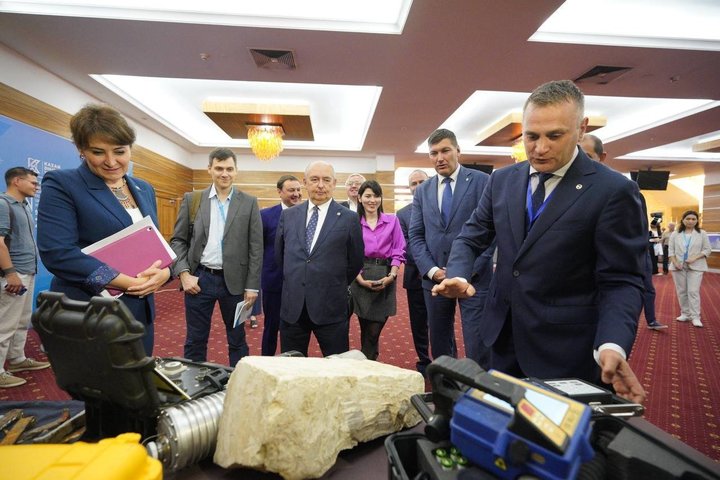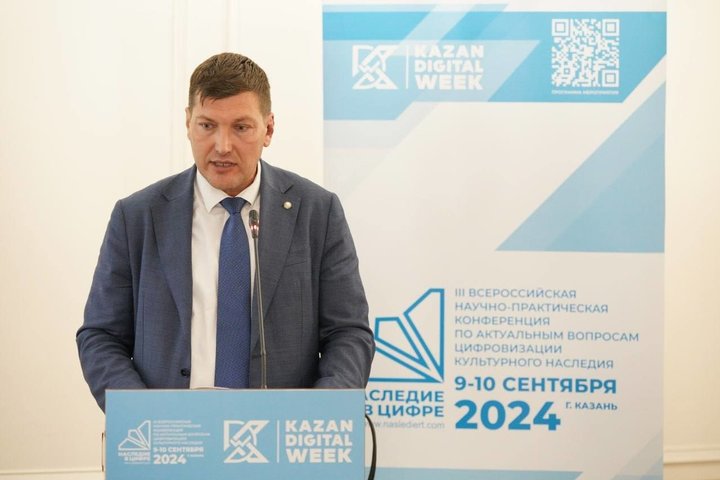Ivan Gushchin: ‘These developments facilitate the work of a civil servant’
Kazan is discussing digitisation of heritage-related works

The third All-Russian scientific conference Heritage in Digital is taking place in Kazan as part of the International Forum Kazan Digital Week 2024: heads and employees of departments responsible for the protection of cultural heritage sites from 40 regions, as well as heads of specialised universities have gathered in Tatarstan. The conference discusses the digitisation of archives, the use of unmanned aerial vehicles for the inspection of architectural and archaeological sites, as well as, for example, the digitalisation of the urban planning industry. Read the details in the material of Realnoe Vremya.
When the time comes to “marry” the registries
“In 1997, when I made a report at a congress on computer technology, most of our practicing colleagues looked at it with great amazement," said the president of the ICOMOS National Committee (International Council on Monuments and Sites), Leonid Kondrashov. “Computers and tablets have turned from an advanced typewriter into a working tool.
Now machines are changing the approach to work. In particular, Nikolay Parfentiev, the director of the Digital Development Department of the Ministry of Construction of Russia, recalled that from September 1, developers would see all the requirements for them in digital form — not only from the Ministry of Construction, but also power units, Ministry of Energy...
“This initiative is aimed at reducing the time of design and construction," Parfentiev pointed out. Then he stressed: “This is not just digitalisation, but organisational changes in approaches to certain processes, the digitalisation of which will reduce the duration of work. There is no point in simply converting a process that was originally in paper into electronic form. When converting, it is necessary to review the entire business process.

It is curious that the head of the Committee for Cultural Heritage Protection, Ivan Gushchin, spoke at the very beginning of his speech about the new challenges of the time, saying that his department also employs a digital security specialist. And that at last year's Kazan Digital Week, the committee signed a contract with RusBITech-Astra, now they have Astra Linux at all workplaces.
The committee currently provides 15 public services online. Five of them are massive. For example, this is a request for information on the presence of cultural heritage sites. Gushchin also cited as an example that the archaeologists of the department have processed more than 1,000 applications this year alone for land reclamation procedure.
“Roman Alekseevich, there has been a proposal to make standard requirements for regional systems," he addressed Roman Rybalo, the director of the department of state protection of cultural heritage of the Ministry of Culture of Russia, regarding the regional register of cultural heritage sites. “When the time comes to 'marry' the registers, the typology should be uniform.
Exploring the landscape on a computer
In addition, this year the committee has digitised 1.3 million pages of materials that appeared over the past 30-40 years, and created a database, a digital archive of cases. And from March to July of this year, data on the boundaries of the Cultural Heritage Site in XML format were sent to the Office of the Federal Service for State Registration, Cadastre and Cartography in the Republic of Tatarstan. Gushchin also said that Tatarstan, as one of the pilot regions for the project of introducing encumbrances on real estate objects on a single cadastral map, has completed this work in full.
In short, the head of the Cultural Heritage Site Committee several times outlined one of the challenges of digitalisation — the data is accumulating, now it is necessary to integrate them with each other. He also gave out plans for the future, in particular, concerning landscape modeling:
“This is the near future. When a government agency receives all the documentation, it is difficult to check it while sitting in the office. What if it concerns, say, 500 hectares, as in Yelabuga? These developments facilitate the work of a civil servant.

They need transparency
“It is important to ensure transparency of the interaction processes," said Deputy Prime Minister of Tatarstan Leyla Fazleeva. “As soon as the authorities achieve this, it indicates the high efficiency of the committee's activities.
The correspondent of Realnoe Vremya asked the speakers to what extent digitalisation saves money in the processes related to the protection of cultural heritage.
“It saves a lot," Roman Rybalo, the director of the Department of State Protection of Cultural Heritage of the Ministry of Culture of the Russian Federation, began.
And Gushchin added:
“Believe me, it saves time and money for the business community. It also helps us a lot. When we implemented 15 public services on a single portal, we saw what a reduction in the time people spent visiting the committee. Now we are meeting only within the framework of the citizens' appeal. Because, as a rule, they used to contact us about their affairs: why, where they are, at what stage," Rybalo noted.
“Let's start with that digital manages the management process, makes it optimised, makes it transparent and makes management decisions not just on a whim, but to make them based on the data that is received from the territories," summed up Fazleeva. “Of course, this also applies to the processes related to design and construction. These are extremely important processes that take a long time. Accordingly, working with big data already obtained through research allows us to move forward with more intensive steps, and the tempo is completely different.

Digital gives the opportunity to quickly interact with citizens who are interested in preserving or acquiring an object of cultural heritage, the deputy prime minister noted:
“Control, surveillance, which are carried out with the help of digital equipment, is more reliable than just a human eye or, let's say, some tools that we may have used in the past.